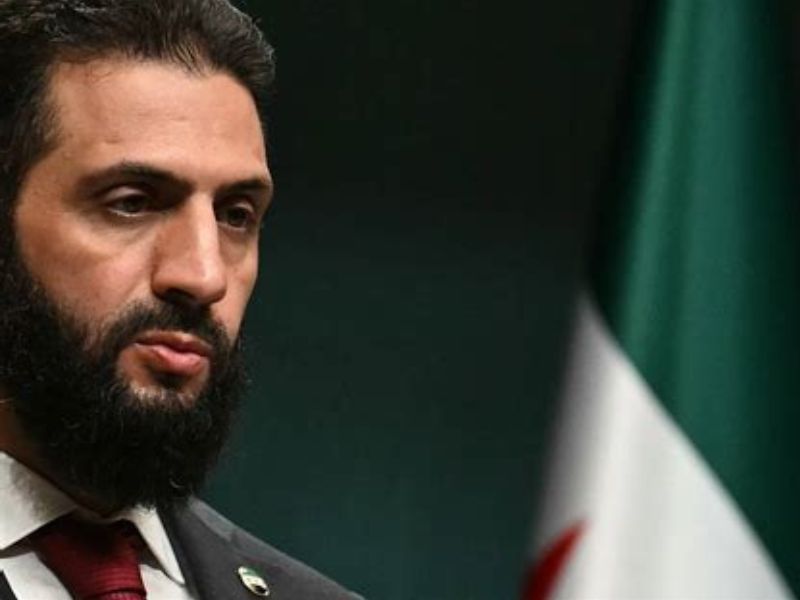U.S. Weighs Permanent Sanctions Relief for Syria After Al-Sharaa White House Visit

Syria’s President Ahmed al-Sharaa visited the White House earlier this week, marking the first visit from a Syrian head of state since the country’s independence in 1946. His trip comes as U.S. President Donald Trump and the U.S. Congress weigh the possibility of a permanent lifting of sanctions on Syria.
While President Trump ordered a reprieve of sanctions in June, al-Sharaa has made the permanent lifting of sanctions a key priority as he works to gain access to the international financial system — a vital step if he is to obtain the hundreds of billions of dollars in foreign investment which experts estimate he will need to rebuild a war-torn Syria.
The most significant U.S. sanctions are imposed under the 2019 Caesar Act, enacted by Congress in response to egregious human rights abuses by the previous Syrian President, Bashar al-Assad, whom al-Sharaa deposed in December.
The permanent lifting of Caesar Act sanctions will require an act of Congress.
Some in Congress have expressed an unwillingness to lift sanctions without certain conditions, such as guarantees of religious pluralism and a positive framework for relations with Israel. To date, President Trump has not indicated that sanctions relief or development assistance will be conditioned on respect for democratic norms or human rights, instead emphasizing his desire to “give Syrians a chance at greatness.”
In one statement in May, President Trump did suggest that he hoped to see Syria provide security for its religious and ethnic minorities as a means of promoting regional security. However, in public meetings with al-Sharaa, he has not emphasized this issue, and his Special Envoy to Syria, Tom Barrack, publicly supports the disarmament of minority communities in favor of total centralization under al-Sharaa’s rule.
Civil society leaders, human rights watchdogs, and minority community representatives have expressed continued concern about the status of ethnoreligious minority communities in Syria as massacres, sporadic attacks, and widespread marginalization have continued to mark al-Sharaa’s nearly year-long administration.
At a recent Capitol Hill event titled “Fortifying Religious Freedom in Syria,” civil society groups gathered in support of decentralization. Speakers included Nadine Maenza, Ambassador Sam Brownback, Representative Frank Wolf, and representatives of the Druze, Alawite, Kurdish, and Christian communities.
A central theme of the event was the successful model established in the semiautonomous Kurdish region in the northeast. Panelists and keynote speakers urged U.S. policymakers and the Syrian government to safeguard this model and extend it to other minority communities.
“Their inclusion in the Syrian Government would strengthen all of Syria,” event organizer Nadine Maenza said afterward, referring to the Kurdish region in the northeast. “A united Syria, with decentralization or federalism, gives this beautiful country its best chance at peace and stability.”
Al-Sharaa is moving toward a system that grants the central government significant authority, rather than a federated system in which local areas retain robust self-determination and the right to organize their own security.
The country’s recent election did not solicit votes directly from the public; instead, it turned to local councils chosen by regional electoral bodies. A direct public vote was deemed logistically impossible at the current time, with many citizens displaced and without proper identification after decades of civil war.
One hundred nineteen new parliamentarians were announced after voting in October. An additional 21 seats were not voted on because they represent areas not currently under government control, and the remaining 70 seats in the 210-member parliament will be appointed directly by al-Sharaa.
Only six seats went to women, and fewer than a dozen went to members of religious and ethnic minority communities. The overwhelming majority of those elected belong to the dominant Sunni majority, leading to concerns that the new parliament may usher in an era marked by Sunni nationalism.
Only a single Christian was elected, according to media reports. While Christians are largely concentrated in cities such as Damascus and Aleppo, these areas did not choose a Christian representative.
Observers, both within the country and internationally, are eagerly awaiting al-Shara’s 70 parliamentary appointments, originally scheduled to be announced in mid-to-late October. However, the original deadline has passed without any appointments being scheduled.
Immediately after the election, Syrian government officials indicated that his appointments would seek to address some of the imbalances in the election results. Whether the appointments make good on that promise or double down on the Sunni majority already in place remains to be seen.
To read more news stories, visit the ICC Newsroom. For interviews, please email [email protected]. To support ICC’s work around the world, please give to our Where Most Needed Fund.
